“A college head coach is many things—tactician, mentor, psychologist, recruiter, leader, CEO, teacher, father figure, face of the program, and all of these things come into play on almost a daily basis,” said Dave Brandt ’85, former head men’s soccer coach at Messiah and current head men’s soccer coach at Hope College in Holland, Michigan.
You don’t have to graduate from Messiah to be a good coach, but it doesn’t hurt. Messiah’s alumni excel as coaches at colleges and universities across the U.S., bringing faith, a work ethic, intellect and leadership skills that enhance sports programs that reach far beyond Grantham. Who are they? How do they do it? What’s a typical day like? (Hint: There’s no typical day.)
While there’s not enough space to include every Messiah alum who coaches at the college level in these few pages, several weighed in to tell us what it takes to mentor the next generation of college athletes.
Glorify God
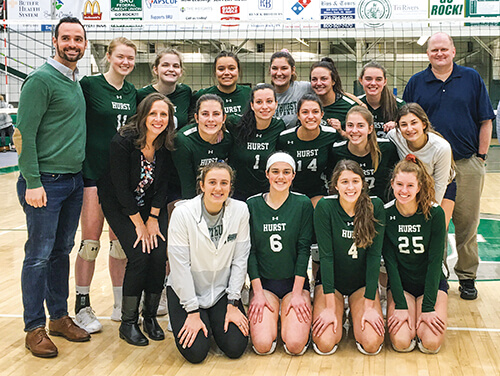
“Messiah definitely prepared me well to coach from my experiences on the women’s soccer team, through my coursework in exercise science, sport management and accounting and through the relationships and mentors I had all across campus who poured into me. My coaches and teammates demonstrated what it means to give your best each day for the glory of God, how to create a culture where you sharpen and serve one another and how you pursue excellence together.”
—Jennifer Myhre ’08, head women’s soccer coach, assistant athletic director, senior woman administrator, Anderson University
“As a coach, my responsibilities include coaching, advising, counseling, recruiting and coordinating all of our travel. I also advise five weekly ministry/Bible study and retreat teams. One of our groups is a student-athlete Bible study. I meet with leaders from each of the groups each week to prepare their programming with them. Working as the former director of the Agape Center also assists me in my role as a coach and the need for students and student athletes to have a cause greater than themselves during their college years.”
—Jenell Patton ’95, assistant volleyball coach and assistant director of campus ministry, Mercyhurst University
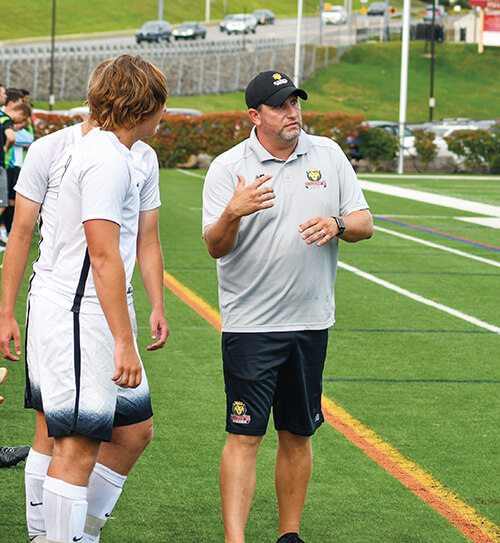
Lead with integrity
“I use much of what I learned on the field and within my team from my college coaches. They were dedicated to creating the best possible experience for me as a player, and I try to emulate that type of environment within my team. That type of service-oriented leadership is what I remember … and want my players to remember after they graduate and enter the work force.”
—Mark Bassett ’01, head men’s soccer coach, director of soccer operations, King’s College
Get an assist(ant)
“I like to get in early to have time to work out and have some personal time in the office. Once the head coach arrives, we spend the majority of the morning talking about how the team is doing, the direction we want the team to head in and how we can continue to grow and get better each day. Our conversations lead to valuable life lessons and personal growth.”
—Sam Ruiz Plaza ’19, graduate assistant for the men’s soccer team, Augsburg University
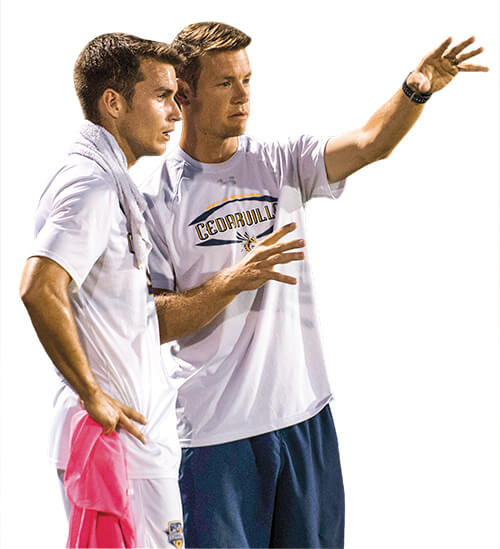
Help with the journey
“I have always felt that coaching in college athletics is one of the greatest opportunities a person can have in terms of making an impact on young people. College is a transformational time of life and in large part it is where you grow up and learn who you are and who you want to be. To be able to speak into the lives of student athletes on a daily basis is an incredible privilege.”
—Brett Faro ’10, head men’s soccer coach, Cedarville University
“I always tell prospective student athletes that I had a very impactful D-III experience, and I feel honored to lead them on their own meaningful college journey. When I was at Messiah, I was fortunate to double major and compete at a high level.”
—Jacqueline Dando ’09, head women’s lacrosse coach, Bucknell University
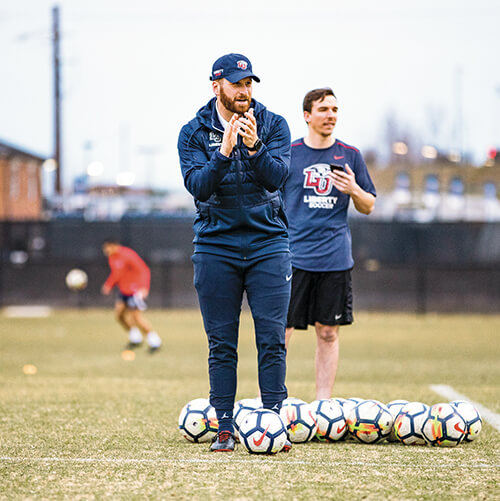
Give grace
“During my education, through my experiences with professors and my time with the men’s soccer program, Messiah provided me with great perspective, recognizing opportunities to grow, as well as opportunities to show grace to others. Not everyone I come in contact with operates on the same level of commitment to excellence, but I also learned at Messiah how to show love and influence people for the better.”
—Jake Berry ’13, assistant men’s soccer coach, Liberty University
Set an example
“The coach at Messiah who I both played for—and coached with for 12 years—was a tremendously important piece of my education at Messiah in general, and then more specifically, for what I do now. I worked directly for 16 years with (former Messiah Head Men’s Soccer Coach) Layton Shoemaker—four as a player and then 12 years as his assistant. The things I learned from him about life, soccer, leadership, coaching, people and how groups function were priceless. Early in my head coaching career, I may as well have had a bracelet that read ‘WWLD’—i.e., ‘What would Layton do?’ Many times as a young coach, and even in later years, I would literally stop to consider how my mentor and coach would have handled this situation or that.”
—Dave Brandt ’85, head men’s soccer coach, Hope College
“Having a coach like Coach Greer/McKay, I was able to grow into a leader on and off the field, learn the importance of time management and integrate my faith in my sport. She was a huge reason why I desired to be a coach outside of school. I wanted to be able to invest in players and young women like she did in my life. Watching Coach Greer in how she ran practices, led film sessions and managed the time spent off the field was the best experience I could have had as an aspiring coach.”
Jenna Stover ’17, assistant coach for women’s lacrosse, Jefferson University
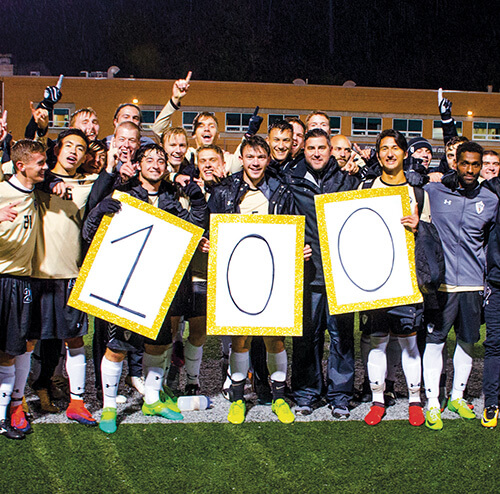
Use your degree
“I truly feel that I received two educations. I received an outstanding academic education in sports and exercise science that helps me each day understand the physical demands that I put my players through. My second education I received from Coach Shoemaker and Coach Brandt. They both invested in me as a soccer player but, more importantly, as a person. Coach Shoemaker showed me how to live my life in a Godly manner, and Coach Brandt encouraged me to become a college soccer coach. I would not be the person I am today without these two men in my life.”
—Gary Dunda ’97, head men’s soccer coach and assistant professor in sports management, Geneva College
“My graduate assistant position allowed me to learn in an incredible lacrosse program while also pursuing a master’s degree. I studied higher education with a concentration in academic support, which allowed me to understand the inner workings of higher education institutions. Also, the academic support side has allowed me to assist my student athletes with their academic needs in a much deeper way.”
—Rebecca Sheinfeld, M.A. ’18, head women’s lacrosse coach
“I was a comm major at Messiah, and the interpersonal communication skills I learned in class have helped me in the job. I am always speaking to people, whether it be recruiting or coaching.”
—Danny Brandt ’18, men’s soccer assistant, Carnegie Mellon University
Recruit, practice, watch film, play the game, repeat
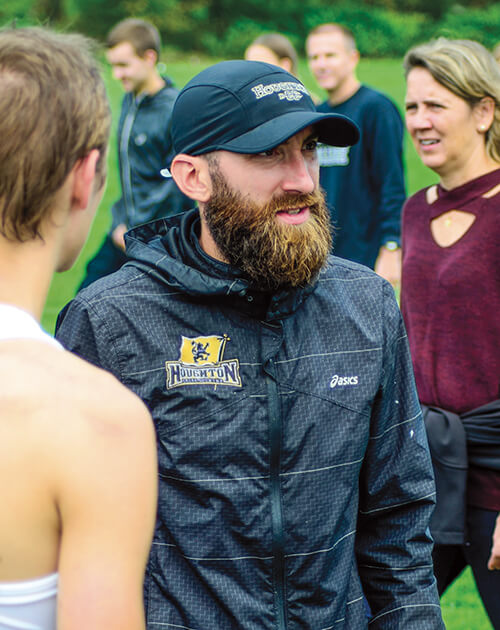
“Each day, there is usually a bit of recruiting work to do. We have meetings, as well as working on budgeting, planning for future events. The most normal part of my day to day are practices, which run 4:30-6:30 p.m. With having a lot of competition on evenings and weekends, it does allow for some midweek flexibility for family and life balance.”
—Patrick Hager ’08, M.A. ’14, head cross country and track and field coach, Houghton College
“My day starts at 5:40 a.m. with practice to avoid the [Florida] heat and thunderstorms in the afternoon.
I invest a lot of my day into my athletes. I have 39 runners on my men’s and women’s teams combined, and I meet for about 15-30 minutes with them biweekly, talking about classes, their training and life. I have department meetings, planning workouts, outreaches and recruiting that fills the rest of the day. I try not to take work home, but oftentimes I need to as there are not enough hours at work, and most calls I do to recruits happen in the evening.”
—Paul Kurtz ’91, director of cross country and assistant track and field coach, Southeastern University